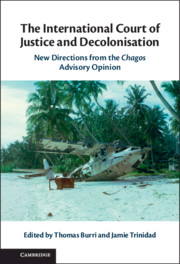 The International Court of Justice and Decolonisation
The International Court of Justice and Decolonisation Book contents
- The International Court of Justice and Decolonisation
- The International Court of Justice and Decolonisation
- Copyright page
- Contents
- Figures
- Tables
- Contributors
- Acknowledgements
- Table of Cases and Awards
- Table of Legislation
- UN General Assembly Resolutions
- National Legislation
- Abbreviations
- 1 Introduction
- 2 Chagos, Custom and the Interpretation of UN General Assembly Resolutions
- 3 Reflections on the Treatment of General Assembly Resolutions in the Chagos Advisory Opinion
- 4 The Chagos Advisory Opinion and the Principle of Consent to Adjudication
- 5 Two Takes on Chagos: Reconciling the Advisory Opinion with the Res Judicata Effect of the UNCLOS Arbitral Award
- 6 State Responsibility in Advisory Proceedings: Thoughts on Judicial Propriety and Multilateralism in the Chagos Opinion
- 7 Peremptory Norms in the Advisory Opinion of the International Court of Justice on the Decolonisation of Mauritius and the Chagos Archipelago
- 8 Reflections on the UK’s Assertion of Sovereignty over the Chagos Archipelago in the Wake of the Chagos Advisory Opinion
- 9 The Chagos Marine Protected Area
- 10 Human Rights and the Chagos Advisory Opinion
- 11 Heightened Scrutiny of Colonial Consent According to the Chagos Advisory Opinion: Pandora’s Box Reopened?
- 12 Chagos and the Perplexities of the Law of Treaties
- 13 Prospect of the Chagos Advisory Opinion and the Subsequent UN General Assembly Resolution Helping to Resolve the Future of the Chagos Archipelago and Its Former Inhabitants: A Political Perspective
- 14 Reflections on the Human Tragedy Underlying the Chagos Case and the Way Forward
- Index
11 - Heightened Scrutiny of Colonial Consent According to the Chagos Advisory Opinion: Pandora’s Box Reopened?
Published online by Cambridge University Press: 13 February 2021
- The International Court of Justice and Decolonisation
- The International Court of Justice and Decolonisation
- Copyright page
- Contents
- Figures
- Tables
- Contributors
- Acknowledgements
- Table of Cases and Awards
- Table of Legislation
- UN General Assembly Resolutions
- National Legislation
- Abbreviations
- 1 Introduction
- 2 Chagos, Custom and the Interpretation of UN General Assembly Resolutions
- 3 Reflections on the Treatment of General Assembly Resolutions in the Chagos Advisory Opinion
- 4 The Chagos Advisory Opinion and the Principle of Consent to Adjudication
- 5 Two Takes on Chagos: Reconciling the Advisory Opinion with the Res Judicata Effect of the UNCLOS Arbitral Award
- 6 State Responsibility in Advisory Proceedings: Thoughts on Judicial Propriety and Multilateralism in the Chagos Opinion
- 7 Peremptory Norms in the Advisory Opinion of the International Court of Justice on the Decolonisation of Mauritius and the Chagos Archipelago
- 8 Reflections on the UK’s Assertion of Sovereignty over the Chagos Archipelago in the Wake of the Chagos Advisory Opinion
- 9 The Chagos Marine Protected Area
- 10 Human Rights and the Chagos Advisory Opinion
- 11 Heightened Scrutiny of Colonial Consent According to the Chagos Advisory Opinion: Pandora’s Box Reopened?
- 12 Chagos and the Perplexities of the Law of Treaties
- 13 Prospect of the Chagos Advisory Opinion and the Subsequent UN General Assembly Resolution Helping to Resolve the Future of the Chagos Archipelago and Its Former Inhabitants: A Political Perspective
- 14 Reflections on the Human Tragedy Underlying the Chagos Case and the Way Forward
- Index
Summary
At the heart of the Chagos Advisory Opinion1 lies paragraph 172, where the International Court of Justice (ICJ) held ‘that heightened scrutiny should be given to the issue of consent in a situation where a part of a non-self-governing territory is separated to create a new colony’. Applying this new and stricter standard for consent, the Court concluded in the very same paragraph that the 1965 detachment of the Chagos Islands from Mauritius, then a colony of the UK, ‘was not based on the free and genuine expression of the will of the people concerned’. Consequently, the Court ruled that the process of decolonisation of Mauritius was not lawfully completed. The Court’s reasoning remains enigmatic; its ruling reminds one of the proverbial ‘black box’ deliberations of a grand jury. The answer the judges provided is clear: the free will of the people was disregarded and consequently the detachment of the Chagos Islands was unlawful. However, the reasons underlying the decision remain opaque.2
- Type
- Chapter
- Information
- The International Court of Justice and DecolonisationNew Directions from the Chagos Advisory Opinion, pp. 207 - 230Publisher: Cambridge University PressPrint publication year: 2021
